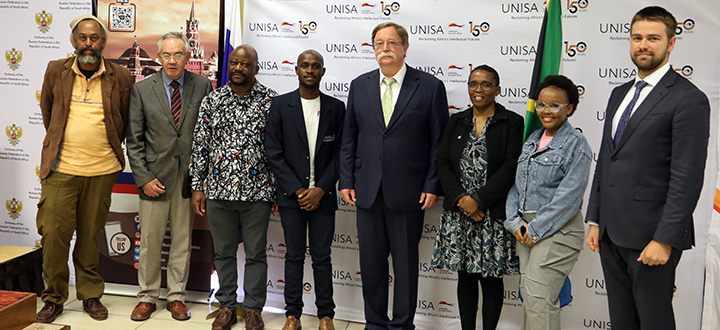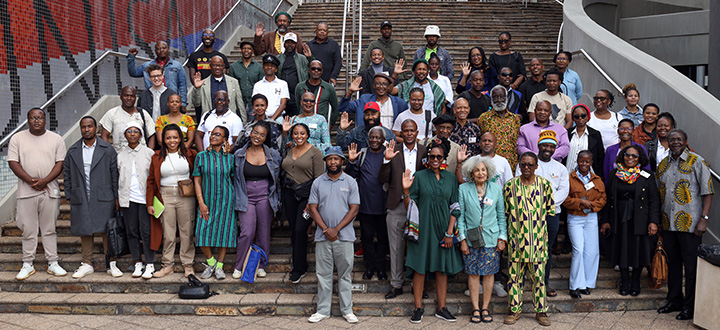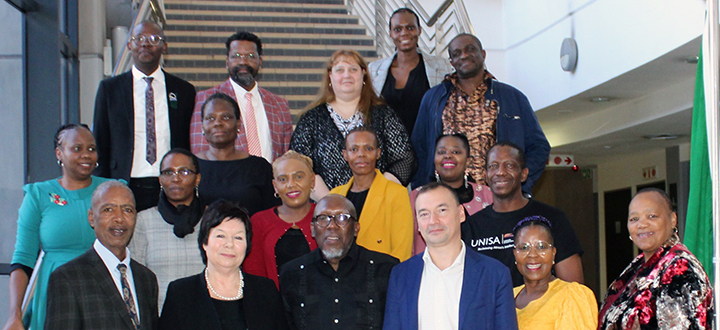College of Agriculture & Environmental Sciences
Research that benefits people's lives

Dr Vhahangwele Masindi (Research fellow: CAES, Unisa) is a nominee in multiple categories in the 2019-2020 NSTF-South32 Awards.
A natural scientist by profession, Dr Vhahangwele Masindi, a research fellow in the College of Agricultural and Environmental Sciences (CAES), Unisa, believes that research can be an instrument to solve daily problems. "Our primary quest as researchers is to develop novel technologies that can be used to improve the lives of South Africans and when you do well, awards will locate you."
Masindi’s research focus is in environmental chemistry, water quality monitoring, wastewater treatment, minerals valorisation and beneficiation. His technologies firmly address the phenomenon of sustainable development through sustainable and eco-friendly initiatives that foster the concept of circular economy. His passion for sustainability is what gained him attention in the development of innovative technologies and approaches for environmental protection.
He has developed, patented and piloted a number of industrially orientated technologies. From his PhD study he managed to file two patent cooperation treaty (PCT) patents in Canada, Australia and other countries. He further refined this technology at the Council for Scientific and Industrial Research (CSIR) where he worked as a Principal Researcher for the Hydraulic Infrastructure Engineering group. The technology earned him numerous awards and nominations within the organisation and other external organisations.
Masindi joined Unisa as a research fellow a few years ago and his expertise adds value at the institution. Appreciating his collaboration with Prof Memory Tekere, also from the Department of Environmental Sciences, CAES, he says it has fully crystallised and they even have a working relationship between Unisa and Magalies Water. This has been confirmed by joint publications, joint research projects to benefit Magalies Water and postgraduate advancement initiatives for Magalies Water through the projects.
The passion-driven doctor is also a Research and Development Manager for Magalies Water. Among others, his key focus is on the development of novel technology for drinking water treatment, assessment and profiling water quality challenges, and technologies refinement. He also reviews papers and proposals for national and international institutions, including the National Research Foundation (NRF) and the Water Research Commission (WRC).
Latest research that impacts on lives
Masindi has three research projects that run concurrently. The project on reclamations of drinking water and the synthesis of valuable minerals from acid mine drainage focuses on the recovery of valuable minerals such as iron for pigment making, gypsum and limestone from the acid mine drainage treatment process. In the process, drinking water that meets the South African National Standards (SANS) 241 and World Health Organisation (WHO) standards was reclaimed. The technology that was developed and piloted by Masindi and his team significantly contributes in reducing pressure on our already stressed water resources.
With regard to the advocating circular economy on municipal wastewater treatment - recovery of valuable minerals and drinking water project, "contamination of our already dwindling water resources due to enrichment with nutrients has been a topical issue in recent decades. It calls for measures to eliminate infestation of our dams with aquatic plants. The Hartebeespoort, Wilge, Bronkhorstspruit, and Roodeplaat dams are in the spotlight. In light of that, the project was tailored with the aim of recovering nutrients in municipal wastewater and beneficiate them for a number of defined uses," said Masindi. It is a tripartite collaboration between Unisa, Magalies Water and the University of Edinburgh in Scotland.
His other project on the profiling of emerging, geogenic and anthropogenic contaminants in groundwater and the development of point-of-use treatment technologies tailored for peri-urban and rural communities of South Africa is also thought-provoking. In brief, the study seeks to profile the load of contaminants and quantify the toxicological impacts, which is associated with the consumption of groundwater in sampled area around the North West Province. It can also aid in highlighting the epidemiology of the area since emerging contaminants could be linked to certain diseases. A consortium of institutions, namely Unisa, Magalies Water, CSIR, Duy Tan University in Vietnam and the University of Edinburgh, are in pursuit of this community-based project.
Nominated in multiple categories in the 2019-2020 NSTF-South32 Awards
Masindi has been nominated in multiple categories in the 2019-2020 NSTF-South32 Awards. He expressed that it is an honour to be recognised for this prestigious award through a nomination. "I feel very honoured as an individual. It serve as a sign that the work we undertake as Unisa and Magalies Water is nationally and internationally recognised."
He concluded by encouraging aspiring researchers to keep pushing with the goal of improving the lives of South Africans.
* By Nancy Legodi, Acting Journalist, Department of Institutional Advancement
Publish date: 2020-05-14 00:00:00.0

 Unisa's student leadership engage with Russian ambassador
Unisa's student leadership engage with Russian ambassador
 Re-igniting and re-imagining Pan Africanism, Afrocentricity and Afrofuturism in the 21st century
Re-igniting and re-imagining Pan Africanism, Afrocentricity and Afrofuturism in the 21st century
 Unisa and Russian State University for the Humanities explore collaborative opportunities
Unisa and Russian State University for the Humanities explore collaborative opportunities
 Young Unisa science stars join elite Lindau Nobel Laureate group
Young Unisa science stars join elite Lindau Nobel Laureate group
 Education MEC addresses Unisa autism seminar
Education MEC addresses Unisa autism seminar